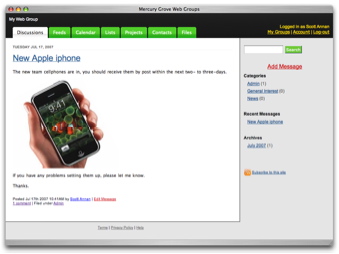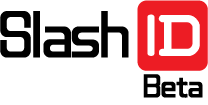Sometimes it’s hard to believe, but it’s true: this Monday, December 3rd, we’ll be hosting the 16th DemoCamp at the Toronto Board of Trade (located in First Canadian Place). What started as a boardroom gathering of a couple of dozen Toronto-area developers showing their current projects to their peers has grown into the city’s premier techie networking event, and the inspiration for other local “Camp”-type gatherings.
Here’s the schedule of events:
| 5:00 | Doors open |
| 6:00 – 7:00 | Demos (see below for details) |
| 7:00 – 7:30 | Break |
| 7:30 – 8:00 | Ignite presentations (see below for details) |
| 9:00 | To the pub! |
Although the Toronto Board of Trade’s meeting room is very large (and has a cash bar to boot!), it has a limited capacity. If you want to attend DemoCamp, you need to sign up on the EventBrite board. As of this writing, there are 59 free attendance slots remaining; if those get used up, there are 78 $10 donation slots, the money from which will be used to help pay for the venue rental.
Some Quick Explanations
Demos are five-minute presentations where the presenter demonstrates one of his or her current projects in action. This isn’t your ordinary presentation: we only want to see your software in action — no slides are allowed! Think of demos as a geeky show-and-tell showing actual software in action rather than a marketing slideshow with a lot of handwaving.
Ignite Presentations are rapid-fire presentations in which the presenter talks over a set of 20 slides that are timed so that each is shown for 15 seconds (the slideshow runs automatically; the presenter just does the talking). The format helps to ensure that the presentations are interesting and get to the point!
And now, the demos and presentations…
Demos
Teaching Test Driven Development with UTest (Igor Foox)
UTest is a tool developed at the University of Toronto to allow students to submit test cases to be run against a professor’s solution to a programming assignment. We will be demoing UTest, as well as an Eclipse plug-in for UTest and explaining how we think it will help undergrad computer science students learn TDD. The community will get to see a new tool to improve the testing skills of their future employees! They will be able to tell us their feedback and so indirectly influence the skills that students graduating in a few years will have.
Sketch Based 3D Modeling with ShapeShop (Ryan Schmidt)
Shapeshop’s demo video. Can’t see the video? Click here.
I will demo a 3D “sketch-based” modeling system called ShapeShop that anyone can learn to use, and scales from simple toy models to significant complexity. Think Google SketchUp, but for everything from CAD to complex organic characters, instead of just blocky shapes.
I have been building it as part of my MSc/PhD research, since 2004. It is under active development, there have been 2 public releases and I just started releasing betas of version 3. My demo should be selected because everyone I have ever shown it to has enjoyed it, from 6-year olds to jaded computer graphics researchers. Also, it’s a good example of what is possible in university research environments.
The community will get a sense of where 3D modeling and user interfaces might be going in the future, and learn about some of the other stuff happening in the UofT lab that BumpTop came out of. They will also get some new software, because ShapeShop is free. 3D modeling software is really hard to use. I have spoken to lots of tech people who maybe want to make a 3D logo, so they try Blender, and it’s incomprehensible, so they give up. ShapeShop isn’t like that – a real, non-trivial model can be sketched in seconds. And it’s fun. And learning the basic interface is extremely easy. When I get kids using ShapeShop on a SmartBoard, we always have to tear them away. So, I’m pretty sure I can “wow” the democamp crowd. As for inspire, the only thing I can say is that I have recently been demo’ing ShapeShop at UofT recruitment events, and there is always a jump in downloads the next day. So, hopefully some people might be inspired to give 3D modeling another try. I guess it might also inspire other students to try to turn some of their projects/research into usable software.
Last but not least, I might have some huge new top-secret features that I will release during the demo, but I can’t promise anything until Monday when the conference reviews come back…
HealthSpoke Demo (Dan Donovan)
We will be demonstrating an early version of the HealthSpoke practice management and integrated wellness application. We will focus on some of the automated test tools (NUnit, WatiN) we are using and frameworks (Microsoft Application Blocks) that make our development life easier. This will give the community another example of the application of these tools to real-world projects, and hopefully give people some ideas on tools they can try as well.
Coming from Waterloo, I am looking to get involved in the Toronto tech / startup scene, and DemoCamp sounds like a great opportunity. We are working on an interesting Web 2.0 / Social Networking application applied to a niche market. Our presentation will provoke some thought on automated test frameworks, and how these can be implemented with limited resources from Day 1!
Web Groups – Virtual Team Collaboration (Scott Annan, Mercury Grove)
My name is Scott Annan and I have been involved in the camp scene for the last 2 years and an active member of the Ottawa startup scene, (where I live). I have also introduced and organized the democamp concept in Cincinnati and Lexington, KY.
I will be doing a demo of our Web Groups collaboration software which is used by over a dozen fortune-500 companies and several more small businesses ranging from floral consultants to international advertising agencies. I would like to provide a perspective on how we financed our business through consulting, and are purposely growing it without ANY investment in a traditional sales team or marketing (including Adwords). We may be able to use DemoCamp to make a new release / killer feature announcement.
SlashID – Anonymous Identity Provider (Zeev Lieber)
We will demonstrate a fully AJAX-based Identity Management system which allows you to manage your passwords and personal data without disclosing them to our own server. Our approach to authentication and identity management differs from traditional ones in that nobody has to ever rely on us or trust us in any way to complete user authentication and personal data disclosure to different web services. We believe that SlashID is the right way to do identity management in the internet setting (as opposed to enterprise setting), since people are becoming increasingly aware of privacy and trust issues.
We want to raise awareness of our approach with the community, and demonstrate the benefits that our system provides to the websites – ease of registration, one click login, single sign on and keeping user’s data always up to date. All these result in better user experience and more users willing to register – which may translate to direct profit for commercial websites. While the procedure of logging in to a website has always been a hassle rather than something inspiring, we believe we can clearly show that hassle going away. We will show how you can login to any SlashID-enabled website with a single click.
We will also show how updating your personal data on our website automatically propagates to all websites you registered with. All this is possible to do from any computer with just a browser. No data stored on your computer, no data disclosed to our server, no plugin installation required. Our system was launched October 16th, and is available at our website.
Ignite Presentations
Co-Creating the Creative City (Mark Kuznicki)
 Richard Florida, author of Rise of the Creative Class and Flight of the Creative Class now calls Toronto home. How can creative people – from artists to software developers – be engaged in the act of city-building? This presentation is intended to quickly get the community up to speed on the creative city idea and to inspire them to participate in making Toronto a better place to create.
Richard Florida, author of Rise of the Creative Class and Flight of the Creative Class now calls Toronto home. How can creative people – from artists to software developers – be engaged in the act of city-building? This presentation is intended to quickly get the community up to speed on the creative city idea and to inspire them to participate in making Toronto a better place to create.
By showing the connections between DemoCamp/BarCamp and Burning Man, I hope to shift the perceptions of the community to see how an artist and a developer might have values and interests in common, and to inspire the audience to find the spark of their creative souls while making the city a better place to live and work.
Understanding What Is and Isn’t Critical (Fraser Kelton, Adaptive Blue)
 In a start-up, where resources are always tight, it’s important to understand what’s critical and what’s not needed. This Ignite Presentation will explore lessons learned (so far) while building our start-up. It’s a study in what we know now, what we didn’t know then, and what we (luckily) got right all along. The goal is to help the democamp community understand what is and isn’t necessary for building a web start-up. From product development to building community, biz dev to IT infrastructure, human resources to pitching VCs… all done in 20 slides. In 5 min.
In a start-up, where resources are always tight, it’s important to understand what’s critical and what’s not needed. This Ignite Presentation will explore lessons learned (so far) while building our start-up. It’s a study in what we know now, what we didn’t know then, and what we (luckily) got right all along. The goal is to help the democamp community understand what is and isn’t necessary for building a web start-up. From product development to building community, biz dev to IT infrastructure, human resources to pitching VCs… all done in 20 slides. In 5 min.
This presentation should be selected because what we’ve learned over the past year will benefit many start-ups. The learning has occurred through a mix of hard work, serendipitous events, painful mistakes, and reflective moments and we’d like to share these lessons with the community in a fun, 5 min, presentation. Contrasting what we have and what we don’t gives some insight into what is necessary and what a start-up can do without. We have over one million downloads of our first product. We don’t have a single server. We have people in three countries. We don’t have an office. We have a CEO who handles front-line support. We don’t have company email… and so on.
The presentation will entertainingly explore how we got to where we are today by loving constraint and learning to bravely question everything. Inspiring tales, told over 15 seconds, drills home what is and isn’t critical to growing an idea into a company.
[Cross-posted to The Adventures of Accordion Guy in the 21st Century.]




